Unit 10 You’re supposed to shake hands. Section B 2a--2e课件(共51张PPT)
文档属性
| 名称 | Unit 10 You’re supposed to shake hands. Section B 2a--2e课件(共51张PPT) | 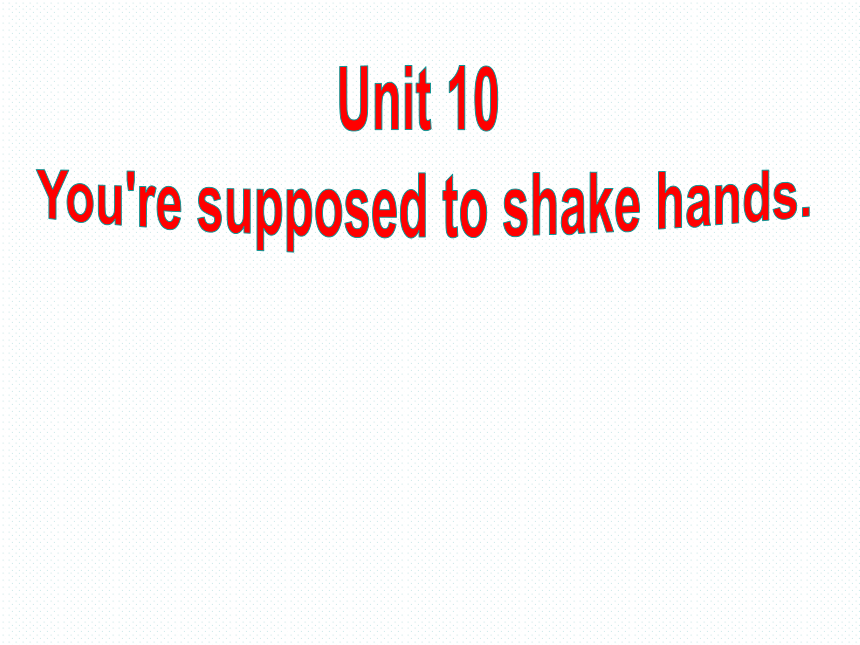 | |
| 格式 | zip | ||
| 文件大小 | 983.7KB | ||
| 资源类型 | 教案 | ||
| 版本资源 | 人教新目标(Go for it)版 | ||
| 科目 | 英语 | ||
| 更新时间 | 2018-11-02 15:07:28 | ||
图片预览

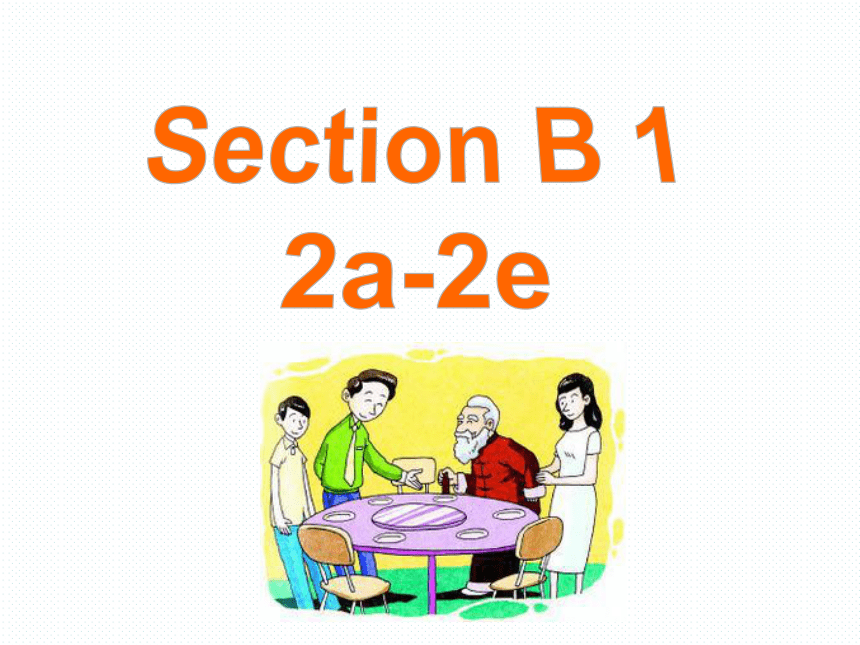
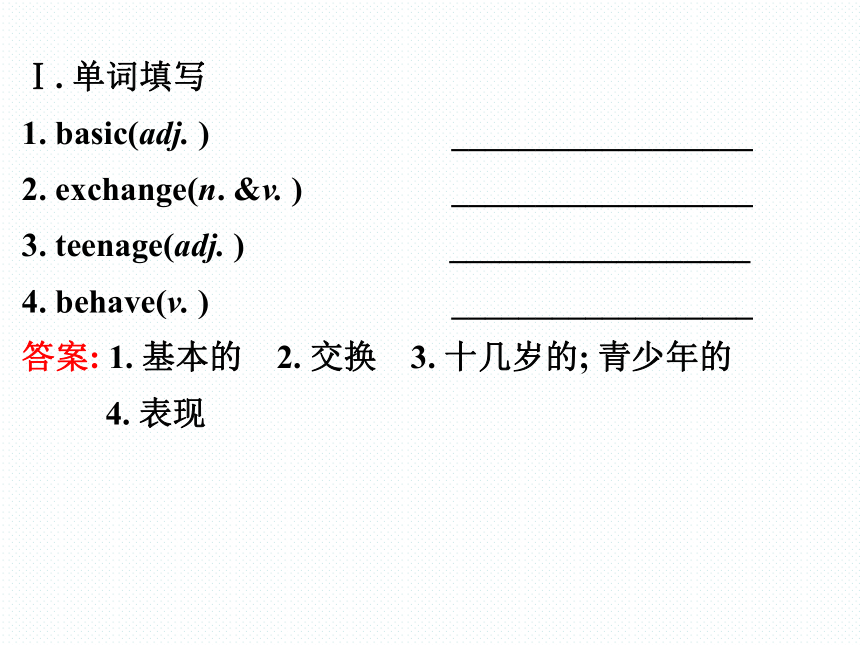
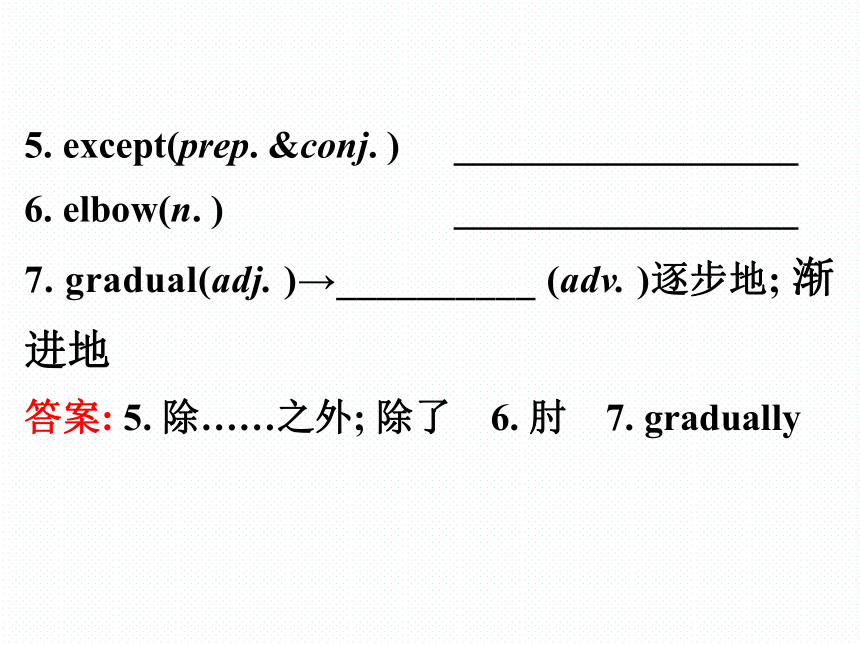
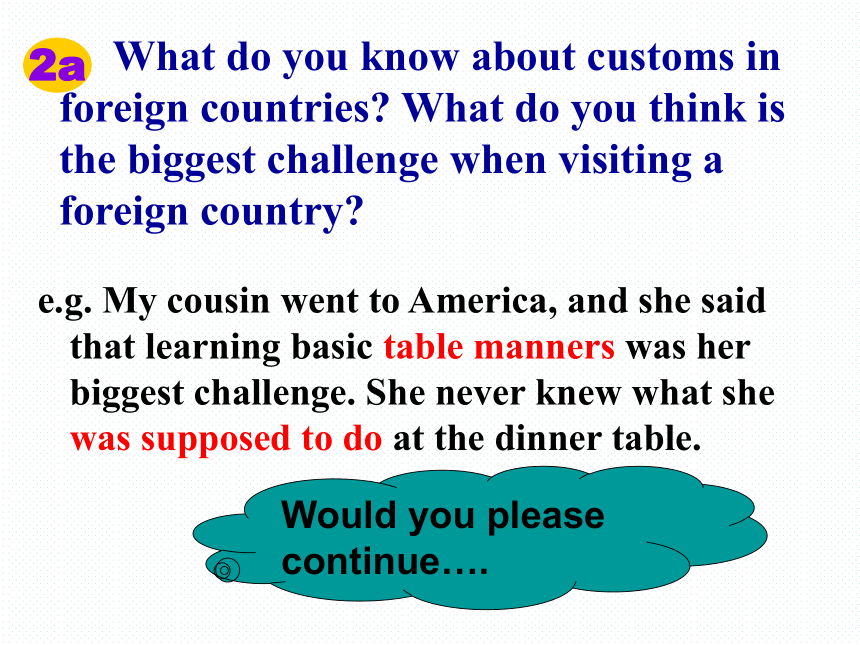


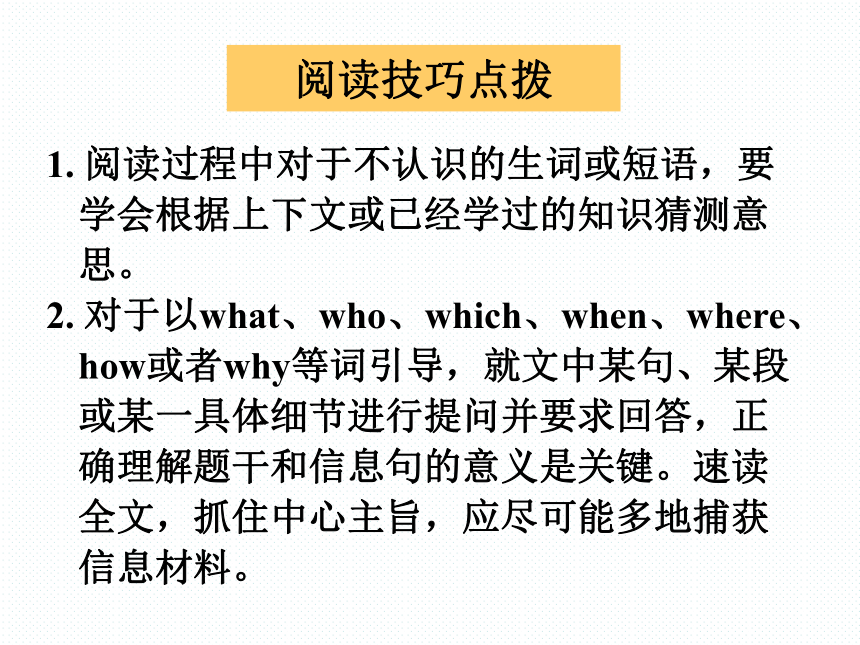
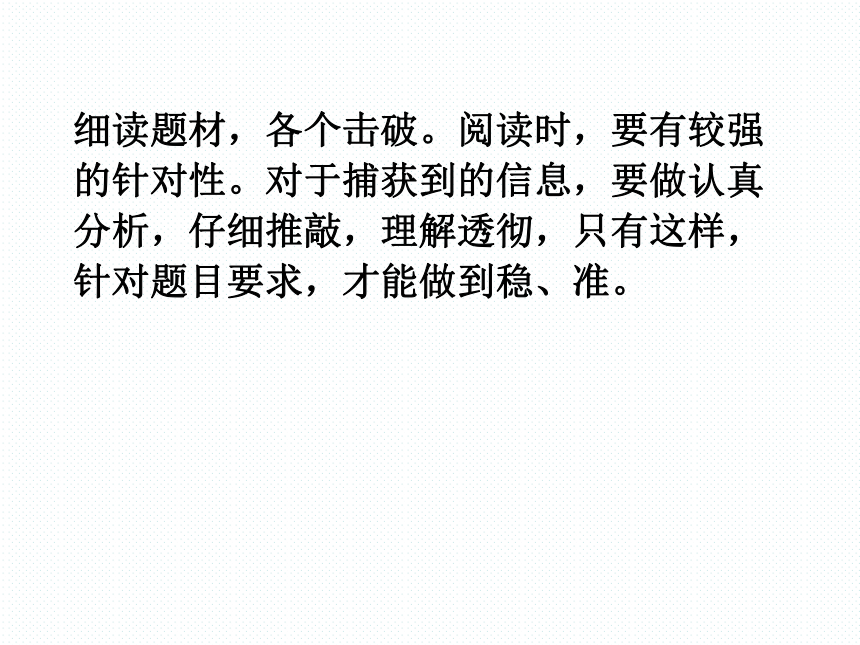



文档简介
课件51张PPT。Unit 10
You're supposed to shake hands.Section B 1
2a-2eⅠ. 单词填写
1. basic(adj. ) __________________
2. exchange(n. &v. ) __________________
3. teenage(adj. ) __________________
4. behave(v. ) __________________
答案: 1. 基本的 2. 交换 3. 十几岁的; 青少年的
4. 表现5. except(prep. &conj. ) __________________
6. elbow(n. ) __________________
7. gradual(adj. )→__________ (adv. )逐步地; 渐进地
答案: 5. 除……之外; 除了 6. 肘 7. gradually What do you know about customs in foreign countries? What do you think is the biggest challenge when visiting a foreign country?e.g. My cousin went to America, and she said that learning basic table manners was her biggest challenge. She never knew what she was supposed to do at the dinner table.Would you please continue….2aCan they eat fruit with their hands? Read the letter and answer the questions.2bREVIEWING
Taking notes or summarizing the main ideas can help you move language from your short-term to long-term memory.阅读技巧点拨 1. 阅读过程中对于不认识的生词或短语,要学会根据上下文或已经学过的知识猜测意思。
2. 对于以what、who、which、when、where、how或者why等词引导,就文中某句、某段或某一具体细节进行提问并要求回答,正确理解题干和信息句的意义是关键。速读全文,抓住中心主旨,应尽可能多地捕获信息材料。细读题材,各个击破。阅读时,要有较强的针对性。对于捕获到的信息,要做认真分析,仔细推敲,理解透彻,只有这样,针对题目要求,才能做到稳、准。Let’s learn some
language points1. They go out of their way to make me feel at home.
go out of one’s way 特地;格外努力
e.g. John went out of his way to make
his girl friend happy.
约翰想方设法使他的女朋友高
兴。Language pointsmake sb. feel at home 使某人感到宾至如归
e.g. I’m doing everything I can to make
them feel at home.
我在尽我一切所能使他们感到宾至
如归。2. You wouldn’t believe how quickly my French has improved because of that.
You wouldn’t believe …是一个常用句式,相当于汉语所说的“你无法想象……;你想都想不到……;你绝不会相信……”,表示所陈述的事情超出想象之外。与此类似的表达还有You would never believe…或You would hardly believe…。例如:You wouldn’t believe that he found his long-lost sister in Taiwan!
你绝对想不到他在台湾找到了失散多年的姐姐!
You would never believe what quick progress he’s made ever since he attended your class.
你根本无法想象,自从他听了您的讲课后进步有多大。3. worry vt. 使烦恼, 使焦虑
【语境领悟】
*Although I still make lots of mistakes, it doesn’t worry me like it used to.
尽管我还是会出很多错, 但是不像以前那样使我烦恼。
*Tell them not to worry. 告诉他们不要担心。
*Don’t worry about John. (= Don’t be worried about John).
不要担心约翰。【自主归纳】
(1)worry作及物动词, 意为“使烦恼, 使焦虑”, 常接sb. 作宾语。
(2)worry作不及物动词, 意为“烦恼, 担心, 发愁”, 常跟介词about或over。
(3)worry about和be worried______都表示“对……担心, 忧虑”。
答案: about 【归纳拓展】
worried和worrying都可作形容词, 前者表示“烦恼的, 焦虑的”, 常用来说明人; 后者表示“令人烦恼的, 令人担心的”, 常用来说明事物。例如:
She seems worried about something.
她似乎为某事担心。
I have never spent such a worrying day.
我从未度过如此令人担忧的一天。【学以致用】
—Oh! We’ve just missed the 8 o’clock film.
—______. It’ll be on again in one hour.
A. My pleasure B. Have fun
C. Don’t worry D. Good idea4. My biggest challenge is learning how to behave at the dinner table.
learning how to behave at the table是现在分词短语,在此用作句子的表语。再如:
His main hobby is fishing.
他的主要爱好是钓鱼。
The most important thing is getting there in time. 最重要的事是及时到达那里。behave
【讲解】behave是不及物动词,意为“表现;行为”,behave well / badly表示“表现好/糟糕”。它的名词形式behaviour (举止;行为),是不可数名词。【运用】请根据汉语意思补全英语句
子,每空一词。
(1) 如果你那样表现,你会让人厌恶的。
____ you _______ like that, you’ll get yourself disliked.
(2) 如此的行为可能招致麻烦。
_____ _________ may cause trouble.If behaveSuch behaviour5. As you can imagine, things are very different from the way they are at home.
正如你所能想象到的, 情况与国内的方式大不一样。【句型剖析】as作为连词, 常引导从句: 【归纳拓展】
as作为副词, 常与连词as连用, as. . . as. . . 意为“和……一样……”, 中间用形容词或副词的原级。例如: My shoes are as beautiful as hers. 我的鞋和她的鞋一样漂亮。【学以致用】
这男孩边骑车边唱一首流行歌。
The boy was singing a popular song__________ he was bicycling.
答案: as6. except prep. 除……之外; conj. 除了; 只是
【语境领悟】
*Another example is you’re not supposed to eat anything with your hands except bread, not even fruit. 另一个例子是除了面包你不应该用手拿着吃任何东西, 甚至水果也不应该拿着吃。*There is nothing but a card in the box.
盒子里除了一张卡片之外什么也没有。
*I like many other sports besides swimming.
除了游泳, 我还喜欢许多其他运动。
*I am feeling well except for having a cold sometimes.
除了偶尔感冒, 我身体一直很好。【自主归纳】
except作介词, 意为“除……之外”。
They were all there except me. 除了我以外, 他们都在那里。【妙辨异同】except/besides/but/except for的辨析
(1)except意为“除……之外”, 不包括后面的内容。
(2)besides意为“除……之外, 还有……”, 包括besides后的内容。
(3)but与except同义, 如果句中有no one, nobody, nothing, all, everyone, everything等词, 多用but。
(4)except for意为“除……之外”, 说明整体情况后, 从细节上加以修正。【学以致用】
All of you went to the zoo ______Wang Hai. He had to look after his grandma.
A. besides B. with
C. except D. besideMost of the kids in our school enjoy pop songs, ______some hit songs on the Internet likeGangnam Style.
A. besides B. including
C. except D. without
【解析】选B。考查介词。句意: 我们学校的大多数孩子都喜欢流行歌曲, 包括网络上像《江南Style》这样流行的一些歌曲。besides“除……之外(还)”, except“除……之外”(从整体中除去个别), without“没有”。以上三个介词都不符合句意。7. I have to say, I find it difficult to remember everything, but I’m gradually getting used to things and don’t find them so strange any more.
我不得不说,我觉得记住所有的规矩是很难的,但是我也渐渐习惯了这些,不再觉得它们奇怪了。(1)在 I find it difficult to remember . . . 句中,it是形式宾语,真正的宾语是后面的动词不定式短语to remember everything。其句型结构为:find+ it + adj. + to do sth. 。类似用法的动词还有:think, believe, know, feel等。
(2)be/get used to 意为“习惯于……”,
后接名词、代词或动名词。 ①I find ______ important to get along well with others.
A. that B. this C. it D. them
解析:选C。本题考查it 作形式宾语的用法。句中it代替不定式短语 “to get along well with others”作形式宾语。②Tony used to ______ to school, but he is used to ______ to school now.
A. walk; taking a bus B. walked; took a bus
C. walk; take a bus D. walk; took a bus
.解析:选A。句意:Tony过去常步行去上学,但他现在习惯了乘公共汽车去上学。used to“过去经常”,后接动词原形;be used to doing sth. “习惯于做某事”。故选A。 Careful readingRead the letter and answer the questions.2b1. Why is Li Yue in France?She is an exchange student in France. 2. Does she enjoy staying with her host
family? How do you know?Yes, she does. Her host family is really nice. They go out of their way to make her feel at home. The grandmother makes Chinese food for her and the granddaughter is kind and talks to her in French to give her practice.3. How does she feel about making mistakes when she speaks French?
4. What is the biggest challenge she is facing?It doesn’t worry her as it used to.Her biggest challenge is how to behave at the dinner table. Post reading2c★ Guess the words you don’t know when you read the passage.
★ Read the sentences and replace the underline words with the phrases in the box. Review the passage and make notes about French customs in the chart.2dYou’re expected to cut up your fruit and eat it with a fork.
You’re expected to say “That was delicious” if you don’t want any more food. You are not supposed to eat anything with your hands except bread.
You’re not supposed to say you are full.
You are not supposed to put your elbows on the table.1. Compare the table manners in France and China in your group. How are they the same or different? Make a list.
2. Share your ideas with your class.e.g. In France, people put their bread on the table. But in China, we always put our food on a plate or in a bowl. We never put food on the table. Group work2e短语互译
1. go out of one’s way ______________
2. make sb. feel at home ______________
3. 习惯于 get used________
4. 犯很多错误 make lots of________
答案: 1. 特地 2. 使(某人)感到宾至如归 3. to
4. mistakes句型填词
1. 对于她说法语时出的错, 她感觉如何?
__________ __________ she feel__________ __________ mistakes when she speaks French?
2. 他们特地让我感觉到宾至如归。
They go out__________ their way to make me__________ at home.
3. 现在说法语我非常舒服。
I’m very comfortable__________ French now.
答案: 1. How does; about making 2. of; feel
3. speaking4. 我最大的挑战就是学会在餐桌上时如何表现。
My biggest challenge is__________ how__________ __________ at the dinner table.
5. 我得说我发现记住一切很难, 可是我正逐步地习惯它。
I have to say that I find__________ difficult__________ remember everything, but I’m gradually getting used__________ it.
答案: 4. learning; to behave 5. it; to; to完成句子
1. 我发现在网上聊天很有趣。
I find__________ interesting__________ __________ online.
2. 上周末, 除了琳达我们都去爬山了。
We all went climbing the hills__________ Linda last weekend.
3. 听音乐能使我们放松。
Listening to music can__________ us__________ relaxed.
答案: 1. it; to chat 2. except 3. make; feel 4. 我最大的问题就是学会如何赚钱。
My biggest problem is__________ __________ to make money.
5. 露西过去常去超市购物, 但现在她习惯于网购。
Lucy__________ __________ go shopping in a supermarket, but now she__________ __________ __________ buying things online.
答案: 4. learning how 5. used to; is/gets used to
You're supposed to shake hands.Section B 1
2a-2eⅠ. 单词填写
1. basic(adj. ) __________________
2. exchange(n. &v. ) __________________
3. teenage(adj. ) __________________
4. behave(v. ) __________________
答案: 1. 基本的 2. 交换 3. 十几岁的; 青少年的
4. 表现5. except(prep. &conj. ) __________________
6. elbow(n. ) __________________
7. gradual(adj. )→__________ (adv. )逐步地; 渐进地
答案: 5. 除……之外; 除了 6. 肘 7. gradually What do you know about customs in foreign countries? What do you think is the biggest challenge when visiting a foreign country?e.g. My cousin went to America, and she said that learning basic table manners was her biggest challenge. She never knew what she was supposed to do at the dinner table.Would you please continue….2aCan they eat fruit with their hands? Read the letter and answer the questions.2bREVIEWING
Taking notes or summarizing the main ideas can help you move language from your short-term to long-term memory.阅读技巧点拨 1. 阅读过程中对于不认识的生词或短语,要学会根据上下文或已经学过的知识猜测意思。
2. 对于以what、who、which、when、where、how或者why等词引导,就文中某句、某段或某一具体细节进行提问并要求回答,正确理解题干和信息句的意义是关键。速读全文,抓住中心主旨,应尽可能多地捕获信息材料。细读题材,各个击破。阅读时,要有较强的针对性。对于捕获到的信息,要做认真分析,仔细推敲,理解透彻,只有这样,针对题目要求,才能做到稳、准。Let’s learn some
language points1. They go out of their way to make me feel at home.
go out of one’s way 特地;格外努力
e.g. John went out of his way to make
his girl friend happy.
约翰想方设法使他的女朋友高
兴。Language pointsmake sb. feel at home 使某人感到宾至如归
e.g. I’m doing everything I can to make
them feel at home.
我在尽我一切所能使他们感到宾至
如归。2. You wouldn’t believe how quickly my French has improved because of that.
You wouldn’t believe …是一个常用句式,相当于汉语所说的“你无法想象……;你想都想不到……;你绝不会相信……”,表示所陈述的事情超出想象之外。与此类似的表达还有You would never believe…或You would hardly believe…。例如:You wouldn’t believe that he found his long-lost sister in Taiwan!
你绝对想不到他在台湾找到了失散多年的姐姐!
You would never believe what quick progress he’s made ever since he attended your class.
你根本无法想象,自从他听了您的讲课后进步有多大。3. worry vt. 使烦恼, 使焦虑
【语境领悟】
*Although I still make lots of mistakes, it doesn’t worry me like it used to.
尽管我还是会出很多错, 但是不像以前那样使我烦恼。
*Tell them not to worry. 告诉他们不要担心。
*Don’t worry about John. (= Don’t be worried about John).
不要担心约翰。【自主归纳】
(1)worry作及物动词, 意为“使烦恼, 使焦虑”, 常接sb. 作宾语。
(2)worry作不及物动词, 意为“烦恼, 担心, 发愁”, 常跟介词about或over。
(3)worry about和be worried______都表示“对……担心, 忧虑”。
答案: about 【归纳拓展】
worried和worrying都可作形容词, 前者表示“烦恼的, 焦虑的”, 常用来说明人; 后者表示“令人烦恼的, 令人担心的”, 常用来说明事物。例如:
She seems worried about something.
她似乎为某事担心。
I have never spent such a worrying day.
我从未度过如此令人担忧的一天。【学以致用】
—Oh! We’ve just missed the 8 o’clock film.
—______. It’ll be on again in one hour.
A. My pleasure B. Have fun
C. Don’t worry D. Good idea4. My biggest challenge is learning how to behave at the dinner table.
learning how to behave at the table是现在分词短语,在此用作句子的表语。再如:
His main hobby is fishing.
他的主要爱好是钓鱼。
The most important thing is getting there in time. 最重要的事是及时到达那里。behave
【讲解】behave是不及物动词,意为“表现;行为”,behave well / badly表示“表现好/糟糕”。它的名词形式behaviour (举止;行为),是不可数名词。【运用】请根据汉语意思补全英语句
子,每空一词。
(1) 如果你那样表现,你会让人厌恶的。
____ you _______ like that, you’ll get yourself disliked.
(2) 如此的行为可能招致麻烦。
_____ _________ may cause trouble.If behaveSuch behaviour5. As you can imagine, things are very different from the way they are at home.
正如你所能想象到的, 情况与国内的方式大不一样。【句型剖析】as作为连词, 常引导从句: 【归纳拓展】
as作为副词, 常与连词as连用, as. . . as. . . 意为“和……一样……”, 中间用形容词或副词的原级。例如: My shoes are as beautiful as hers. 我的鞋和她的鞋一样漂亮。【学以致用】
这男孩边骑车边唱一首流行歌。
The boy was singing a popular song__________ he was bicycling.
答案: as6. except prep. 除……之外; conj. 除了; 只是
【语境领悟】
*Another example is you’re not supposed to eat anything with your hands except bread, not even fruit. 另一个例子是除了面包你不应该用手拿着吃任何东西, 甚至水果也不应该拿着吃。*There is nothing but a card in the box.
盒子里除了一张卡片之外什么也没有。
*I like many other sports besides swimming.
除了游泳, 我还喜欢许多其他运动。
*I am feeling well except for having a cold sometimes.
除了偶尔感冒, 我身体一直很好。【自主归纳】
except作介词, 意为“除……之外”。
They were all there except me. 除了我以外, 他们都在那里。【妙辨异同】except/besides/but/except for的辨析
(1)except意为“除……之外”, 不包括后面的内容。
(2)besides意为“除……之外, 还有……”, 包括besides后的内容。
(3)but与except同义, 如果句中有no one, nobody, nothing, all, everyone, everything等词, 多用but。
(4)except for意为“除……之外”, 说明整体情况后, 从细节上加以修正。【学以致用】
All of you went to the zoo ______Wang Hai. He had to look after his grandma.
A. besides B. with
C. except D. besideMost of the kids in our school enjoy pop songs, ______some hit songs on the Internet likeGangnam Style.
A. besides B. including
C. except D. without
【解析】选B。考查介词。句意: 我们学校的大多数孩子都喜欢流行歌曲, 包括网络上像《江南Style》这样流行的一些歌曲。besides“除……之外(还)”, except“除……之外”(从整体中除去个别), without“没有”。以上三个介词都不符合句意。7. I have to say, I find it difficult to remember everything, but I’m gradually getting used to things and don’t find them so strange any more.
我不得不说,我觉得记住所有的规矩是很难的,但是我也渐渐习惯了这些,不再觉得它们奇怪了。(1)在 I find it difficult to remember . . . 句中,it是形式宾语,真正的宾语是后面的动词不定式短语to remember everything。其句型结构为:find+ it + adj. + to do sth. 。类似用法的动词还有:think, believe, know, feel等。
(2)be/get used to 意为“习惯于……”,
后接名词、代词或动名词。 ①I find ______ important to get along well with others.
A. that B. this C. it D. them
解析:选C。本题考查it 作形式宾语的用法。句中it代替不定式短语 “to get along well with others”作形式宾语。②Tony used to ______ to school, but he is used to ______ to school now.
A. walk; taking a bus B. walked; took a bus
C. walk; take a bus D. walk; took a bus
.解析:选A。句意:Tony过去常步行去上学,但他现在习惯了乘公共汽车去上学。used to“过去经常”,后接动词原形;be used to doing sth. “习惯于做某事”。故选A。 Careful readingRead the letter and answer the questions.2b1. Why is Li Yue in France?She is an exchange student in France. 2. Does she enjoy staying with her host
family? How do you know?Yes, she does. Her host family is really nice. They go out of their way to make her feel at home. The grandmother makes Chinese food for her and the granddaughter is kind and talks to her in French to give her practice.3. How does she feel about making mistakes when she speaks French?
4. What is the biggest challenge she is facing?It doesn’t worry her as it used to.Her biggest challenge is how to behave at the dinner table. Post reading2c★ Guess the words you don’t know when you read the passage.
★ Read the sentences and replace the underline words with the phrases in the box. Review the passage and make notes about French customs in the chart.2dYou’re expected to cut up your fruit and eat it with a fork.
You’re expected to say “That was delicious” if you don’t want any more food. You are not supposed to eat anything with your hands except bread.
You’re not supposed to say you are full.
You are not supposed to put your elbows on the table.1. Compare the table manners in France and China in your group. How are they the same or different? Make a list.
2. Share your ideas with your class.e.g. In France, people put their bread on the table. But in China, we always put our food on a plate or in a bowl. We never put food on the table. Group work2e短语互译
1. go out of one’s way ______________
2. make sb. feel at home ______________
3. 习惯于 get used________
4. 犯很多错误 make lots of________
答案: 1. 特地 2. 使(某人)感到宾至如归 3. to
4. mistakes句型填词
1. 对于她说法语时出的错, 她感觉如何?
__________ __________ she feel__________ __________ mistakes when she speaks French?
2. 他们特地让我感觉到宾至如归。
They go out__________ their way to make me__________ at home.
3. 现在说法语我非常舒服。
I’m very comfortable__________ French now.
答案: 1. How does; about making 2. of; feel
3. speaking4. 我最大的挑战就是学会在餐桌上时如何表现。
My biggest challenge is__________ how__________ __________ at the dinner table.
5. 我得说我发现记住一切很难, 可是我正逐步地习惯它。
I have to say that I find__________ difficult__________ remember everything, but I’m gradually getting used__________ it.
答案: 4. learning; to behave 5. it; to; to完成句子
1. 我发现在网上聊天很有趣。
I find__________ interesting__________ __________ online.
2. 上周末, 除了琳达我们都去爬山了。
We all went climbing the hills__________ Linda last weekend.
3. 听音乐能使我们放松。
Listening to music can__________ us__________ relaxed.
答案: 1. it; to chat 2. except 3. make; feel 4. 我最大的问题就是学会如何赚钱。
My biggest problem is__________ __________ to make money.
5. 露西过去常去超市购物, 但现在她习惯于网购。
Lucy__________ __________ go shopping in a supermarket, but now she__________ __________ __________ buying things online.
答案: 4. learning how 5. used to; is/gets used to
同课章节目录
- Unit 1 How can we become good learners.
- Section A
- Section B
- Unit 2 I think that mooncakes are delicious!
- Section A
- Section B
- Unit 3 Could you please tell me where the restroom
- Section A
- Section B
- Unit 4 I used to be afraid of the dark.
- Section A
- Section B
- Unit 5 What are the shirts made of?
- Section A
- Section B
- Review of Units 1-5
- Unit 6 When was it invented?
- Section A
- Section B
- Unit 7 Teenagers should be allowed to choose their
- Section A
- Section B
- Unit 8 It must belong to Carla.
- Section A
- Section B
- Unit 9 I like music that I can dance to.
- Section A
- Section B
- Unit 10 You're supposed to shake hands.
- Section A
- Section B
- Review of Units 6-10
- Unit 11 Sad movies make me cry.
- Section A
- Section B
- Unit 12 Life is full of the unexpected
- Section A
- Section B
- Unit 13 We're trying to save the earth!
- Section A
- Section B
- Unit 14 I remember meeting all of you in Grade 7.
- Section A
- Section B
- Review of Units 11-14
